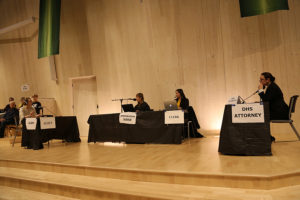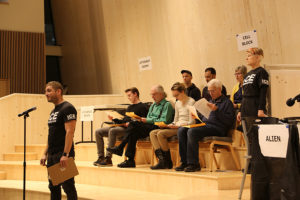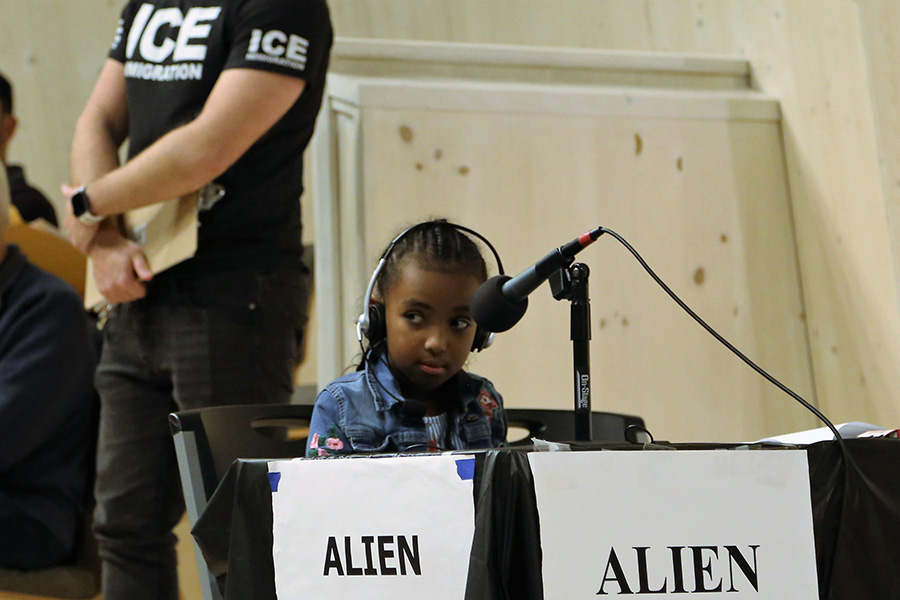This story was reported and written before the global pandemic COVID-19 shut down all theatre activity and most public gatherings, but its themes couldn't be any more urgent. Indeed many advocacy groups are urging that migrants held in detention around the U.S. be released to prevent the rapid spread of the novel coronavirus in crowded detention facilities, and some are filing lawsuits for that purpose. Some of the reportedly 3,600 children in these facilities have already tested positive for the disease. To find out more and offer support, contact Detention Watch Network www.detentionwatchnetwork.org, the ACLU, Southern Poverty Law Center, and the National Immigration Law Center.
On a rainy winter weeknight, the sanctuary of the First Congregational Church of Bellevue, Wash., is gradually filling with people. But this evening, “sanctuary” is probably the wrong word for the high-ceilinged, modern house of worship they are entering.
As they fold up their umbrellas and take their seats, those in attendance may not immediately notice a man and woman wearing black T-shirts with the initials ICE (for Immigration and Customs Enforcement) emblazoned in large white letters, or realize how closely this pair is scrutinizing the crowd of more than a hundred. But it soon sinks in: These keenly observant figures are not typical ushers. Periodically they approach individuals, quietly announcing that they are under arrest. Those “in custody” are then firmly led up the aisle to a corner of the raised altar, where they are seated in chairs and handed papers to read.
Eventually eight people are detained: people of different races, ethnicities, ranging in age from child to senior citizen. Then, as the command “all rise” is heard, a white, middle-aged female judge enters and a hearing begins. It’s not an actual legal proceeding, but it is based on the kind that occurs every day around the United States whenever undocumented immigrants come before a federal judge who will quickly decide their fates. As of September 2019, reportedly more than 55,000 such detainees were being held in prison-like centers and other locked facilities, some in remote areas, for weeks or months. Increasingly these days, they are swiftly deported back to a native land they may have recently fled in fear, or not have lived in for years—or in some cases, since infancy.
The audience knows they are watching an immersive theatrical event titled The Detention Lottery. But for all its obvious artifice, and the intrinsically amateur nature of much of the acting, this portable production devised by Seattle-area immigration attorneys is a riveting, eye-opening, at times shocking encounter with the realities of the current U.S. immigration system.
The definition of immersive theatre, in which the fourth wall between performers and audiences is eliminated, is broad and squishy. It can mean following actors around a spooky mansion during a Shakespeare play, dining and kibitzing within the framework of a murder mystery or cabaret musical—or, in this case, in a vein similar to Augusto Boal’s Theatre of the Oppressed, exploring a provocative social issue and encouraging activism.
But The Detention Lottery does more than dryly inform audiences. By ingeniously placing random audience members in “custody” for the evening, the piece starkly dramatizes the desperate legal position of the roughly 11 million foreign-born U.S. residents who are undocumented—about 3.5 percent of the national population. These people, many longtime residents and tax-paying community members, who are increasingly unwelcome in a land long considered a refuge for, as the Emma Lazarus poem on the Statue of Liberty proclaims, the tired, poor, and wretched of the world “yearning to breathe free.”
Scripted by Margaret O’Donnell, the play is performed monthly at churches, synagogues, and other host institutions sympathetic to the struggle of immigrants and open to sharing a raw docudrama that quietly packs a wallop. (O’Donnell is also offering the play, royalty-free, to those who want to produce it in similar settings, and has penned another related play, Detention.)
According to the playwright, who is also a seasoned immigration attorney, The Detention Lottery grew out of other, less effective educational outreach events. In response to a stunning increase in deportations during the first three years of President Barack Obama’s administration, O’Donnell wanted to let the public know more about imperiled immigrant rights, and the very limited options detainees currently have in our judicial system.
“Back in 2011, I’d already been doing several years of talks about that,” she noted, “mostly at evangelical Christian churches, because that was where many Hispanic immigrants gathered. I did PowerPoint presentations, radio programs. But I didn’t think they were having much of an impact.
“I thought, maybe it would be better to show what really happens to people. What is it like to be arrested by ICE officers, out of the blue, in the middle of living your life? And then to be quickly tried, and deported, leaving your spouse, your family, your work, everything behind?”
Since President Donald Trump took office in 2017, arrests of undocumented immigrants have mushroomed, and the odds of gaining citizenship—particularly for people of color and individuals from so-called Third World nations—have sharply eroded. “President Trump has done everything he can to interpret the immigration laws in the narrowest terms, and implement policy in a way to make it more difficult to come and remain here,” O’Donnell pointed out.
Even foreign-born U.S. residents with legal status, or those married to Americans, are at increasingly high risk of arrest and deportation. “I have had so many clients who were just picked up off the street under racial profiling, and people who got a parking or speeding ticket, or a tail light went out on their car and because they weren’t fluent English speakers didn’t know how to handle it. They didn’t pay, and that gave them a criminal record,” which, she said, can be enough to be detained and denied residency, or even bail.

How to fully humanize and communicate this reality, to spark concern, empathy, and activism? Since undocumented people are increasingly reluctant to come to public events where they might be arrested, how can a play raise awareness with the general public and funds for advocacy groups like Seattle’s Fair Fight Immigration Bond Fund, which collected donations after the Bellevue show?
O’Donnell was already involved in theatre, and first devised a staged reading for this purpose. With legal colleagues, she compiled profiles of 20 fictional immigrants, based on clients who “were summarily detained and then, just, bam! Flown out of the country. It is a very frightening experience.”
At informational events, volunteers would simply read the text aloud, after which a mock judge would pronounce the government’s verdict on each case—granting bail (allowing a detainee to go free, pending another hearing) or ordering immediate deportation. This would be followed by a panel discussion with attorneys.
But in spring 2018, as heightened xenophobic rhetoric led to even more arrests for immigration violations (according to the Bureau of Justice Statistics, they rose from 58,031 in fiscal year 2017 to 108,667 in FY 2018—an 87 percent increase), and with thousands of Latin American refugees taken in custody at the Mexican border for indefinite stays in crowded, privately run facilities like the Tacoma Northwest Detention Center (where many of O’Donnell’s clients were consigned), O’Donnell felt a more urgently dramatic simulation was needed.
“I remember seeing Lynn Nottage’s play Ruined,” O’Donnell recalled. “It was a lightning bolt for me. The cast went around collecting money afterward for victims of the civil war in Congo, and people were so responsive. Theatre brings such things to light in a way that no PowerPoint presentation ever could.”
With fellow immigration lawyers Karin Tolgu and Melissa Campos, O’Donnell created a new ensemble script with eight composite characters (including immigrants originally from Asia, Europe, and Latin America), along with roles usually played by volunteer lawyers: a judge, government and private attorneys, ICE guards.
A pilot presentation of the piece before 60 local social leaders, church representatives, educators, and human rights advocates went well enough for O’Donnell to develop the work into a full-fledged immersive play.
“The random selection of the detainees is so important,” she stressed. “It gives you the shock of recognition—you know, ‘That could be me!’”
Said Detention Lottery director Franca Baroni, “So often we’re used to approaching issues like this from a very cerebral point of view. But there’s nothing like embodying—physically, emotionally—the experience many people actually go through.” (Baroni, an Italian-Swiss native, also wrote and performs an autobiographical solo show about her own immigration story, Act in the Public Heart: A Lawyer’s Journey.)
Tolgu, the immigration lawyer, defined the play’s effect on audiences succinctly: “This is a new way to experience justice and injustice.”

At the Bellevue church performance, those recruited to play detainees were called up one by one before the judge. They read their parts aloud from the scripts handed to them. They were unrehearsed, unpolished, sometimes tentative while delivering their lines. But in O’Donnell’s view, their nervousness mirrors the anxiety and “stage fright” of many tried in immigration courts, where the stakes are high and the proceedings can be Orwellian.
One of the most striking cases in the show concerns a 56-year-old Korean widow and a permanent U.S. resident. (Brief descriptions of the detainee characters are printed in the show’s program.) The mother of three, she was arrested two years earlier after illegally procuring an expensive drug (oxycodone) for a friend in great physical pain who could not afford it. Despite a clean record, she was charged with a drug trafficking felony, served a jail term, and upon release was arrested by ICE because of her criminal conviction.
The strict immigration judge (played with seen-it-all exasperation by Tolgu) insisted there was no recourse but to deport the woman back to Korea—even though she had no connections there, and had not lived in, worked in, or even visited the country for many years.
Another detainee’s story illuminated the heartbreaking situation for people in custody who have a severe mental illness. Brought to the U.S. from the Philippines as a baby, this character was arrested on a burglary charge after mistakenly entering someone else’s house. Sent to immigrant detention, he was shackled because of his erratic behavior and criminal record, put in solitary confinement, and given no significant treatment for his mental condition.
Several requests for a psychiatric evaluation at previous hearings were strangled in bureaucratic red tape. During the play, he could not coherently answer the judge’s simple questions. She grew impatient with him, and made a third request for an assessment to help determine whether he should be packed off—alone, broke, friendless—to Manila. Meanwhile he would remain in solitary detention.
After 10 years defending the defenseless, Tolgu (a U.S. citizen born in Estonia) believes the legal system is failing such people, and it helps her to “let off steam” to be in the judge’s seat for a change. “It’s fun to take on the role, but also, seriously, to show what a kangaroo court these hearings are,” she said. “The judge I play is not meant to be a caricature. She’s rather jaded, and I fully understand that doing this job has always been hard, and it’s gotten worse. One retired judge compared it to trying death penalty cases in a traffic court.”
In other criminal proceedings, Tolgu explained, the government will provide a pro bono attorney for the indigent. But not for immigration offenses. Watching the overworked, annoyed judge played by Tolgu press and admonish detainees for not having legal representation, it becomes clear how few resources many detainees have to mount a defense.

In Bellevue, The Detention Lottery ended with the most troubling case. A young refugee from Honduras, where extreme poverty and violence have led thousands to seek asylum in the U.S., had been separated at the Mexican border from her mother. She was placed in detention, like the reported 69,550 migrant children who faced a similar fate in the U.S. in 2019 alone.
Immigration officials didn’t know where her mother is, and neither did she. The 8-year-old (always played by a child actor) was so frightened and upset she could barely speak in court. “Don’t cry,” the judge told her sternly. “It’s not going to help you. Be a big girl.” And then the judge sent her back to Honduras, alone.
A post-show discussion after The Detention Lottery begins with a question for the audience: If you could give a one-word response to the play, what would it be? After the Bellevue performance, audience members called out “shock” and “rage,” “shame,” “disbelief,” “furious.”
Such reactions are typical. And to help channel anger into action, as they leave each attendee is given a handout about activities in the area hosted by immigrant rights organizations.
At an earlier performance at Seattle’s Temple Beth Am sponsored by the U-District Immigrant Justice Hub, the play “genuinely moved everyone who attended,” according to co-organizer Susan Schulkin. “And I think the audience members came away with a better understanding of just how draconian and inflexible our immigration system can be.”
As for the theatrical format, Schulkin said that “personally, I love learning this way. This immersive production was more engaging and therefore more compelling than a standard presentation or panel discussion could possibly be.”
Lionel Candido Flores, a community college academic advisor, arranged a performance at Green River College in Auburn, Wash., before a student audience.
“One of the most powerful reactions I experienced personally,” said Flores, “was when I was chosen as a detainee and my wife… was chosen to play the role of a detainee’s partner who was advocating for him in court.”
When the judge ordered her removed from the room for shouting out, “I am an American citizen!” it left the Floreses’ 8-year-old son and 4-year-old daughter “unattended and scared” in the audience. “My daughter was crying out for her mother,” he recalled. “This unplanned yet powerful experience gave us a glimpse of what separated families endure each and every day.”
A glimpse that perhaps only immersive theatre could offer.
The performance rights for producing The Detention Lottery in a school, church, community, or nonprofit setting are available for free. To obtain a script and other materials, go here. For more information you may contact Margaret O’Donnell directly at modonnell@globallawadvocates.com.
Seattle-based critic Misha Berson is a frequent contributor to this magazine.
Creative credits for photos: The Detention Lottery by Margaret O’Donnell. Direction: Franca Baroni; production coordination: Heidi Montoya; sets: Mariah Pepper; lighting and tech: Sarah Nassif, Oswald Norton, and Chuck Zachau.


